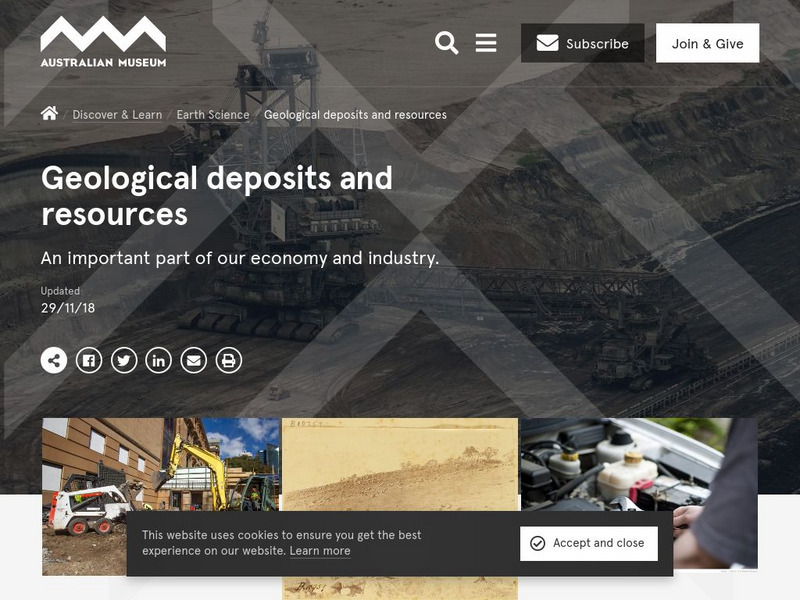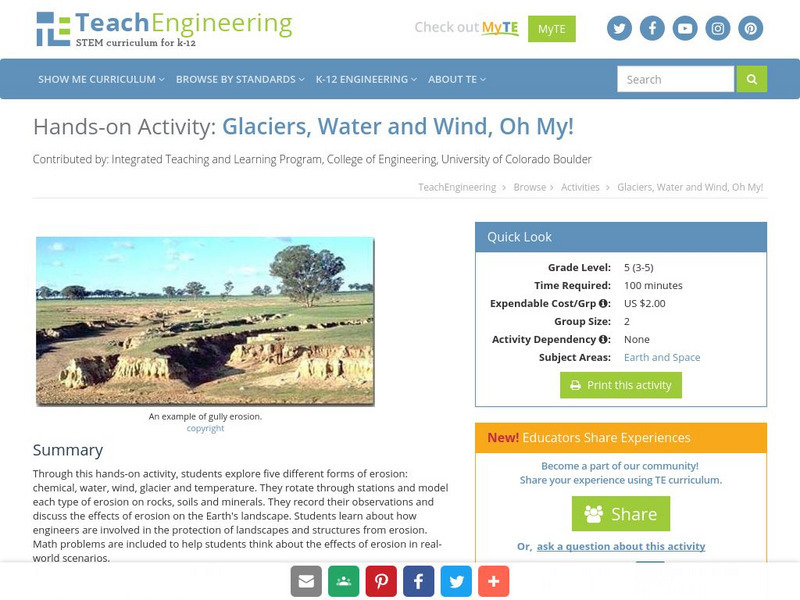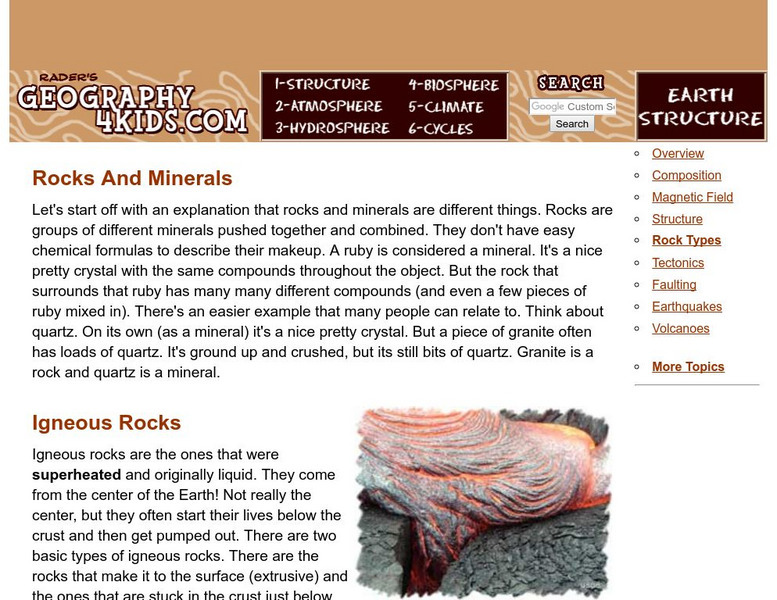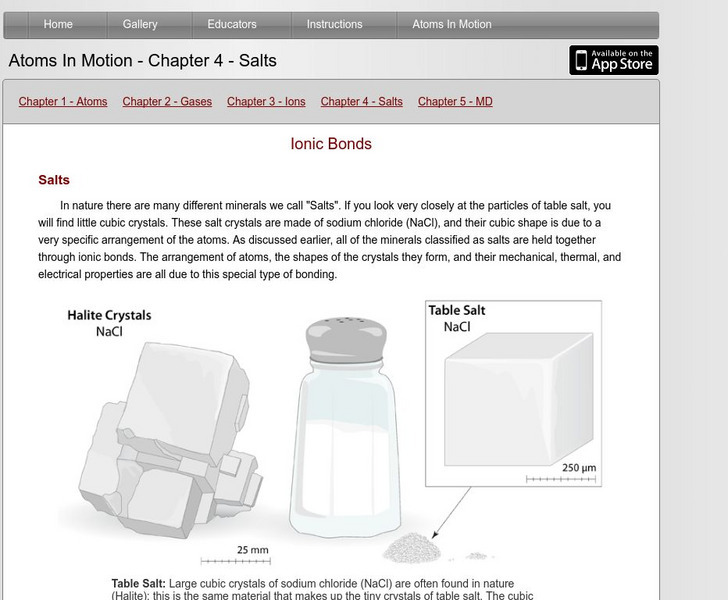Hi, what do you want to do?
eSchool Today
E School Today: What Is an Ecosystem?
Learn about all the different levels of ecosystems, from the living things under a rock, up to a rainforest biome. Explains the levels of organization within an ecosystem, the different types of biomes, food chains and trophic levels,...
Utah Education Network
Uen: Themepark: Cycles
This is a large collection of resources on cycles of nature and the Earth. There is a constant exchange of the elements between air, earth, water, plants, and animals. Most biological processes wind up back where they started. These...
Utah Education Network
Uen: The Dirt on Soil
After completing this lesson, students will understand the source and the process for the formation of soil, the different types of soil, and the components of soil.
Science Struck
Science Struck: Metamorphic Rock Facts: Types
Presents facts about metamorphic rocks and describes the different types.
Other
Kentucky Coal Education: Making Sedimentary Rocks [Pdf]
In this activity, students learn how sedimentary rocks form by making three different types.
Other
Bradshaw Foundation: African Rock Art
This page from the Bradshaw Foundation provides some information on African Rock Art. It also has links to pictures of this type of art in different countries throughout Africa.
Ducksters
Ducksters: Earth Science for Kids: Rocks, Rock Cycle, and Formation
Kids learn about the science of rocks and the rock cycle. How different types such as igneous, sedimentary, and metamorphic form from minerals with the help of nature.
Science Struck
Science Struck: Guide to Mechanical Weathering and Its Major Types
Describes the different types of mechanical weathering and how each of them breaks down rocks.
University of Illinois
University of Illinois Extension: The Great Plant Escape: Soiled Again
Become a detective and solve the soil mystery! To solve the case you must discover what soil is, why it's important, and in what kind of soil do plants grow. You will find out the four components of soil along with the different soil...
Read Works
Read Works: Dig This!
[Free Registration/Login Required] Students read different fossils, how fossils are made, and three different types of rock on Earth. A question sheet is available to help students build skills in comparing and contrasting.
Science Education Resource Center at Carleton College
Serc: Investigating the Rate of Weathering on Various Rock Types.
In this Earth Science field investigation, students will make observations of the rock above and below the Minneopa State Park waterfalls. Students will then make observations of gravestones at Minneopa Cemetery. Through these...
Other
Cal Poly Pomona: Igneous Rocks
If you need a technical summary of igneous rock classification, then this resource is worth checking out. It has several different diagrams to help you visualize the classification process.
Australian Museum
Australian Museum: Geological Ore Deposits
Geoscience: the Earth presents this article on ore deposits. Read how deposits are found, formed and classified, and the economic viability of these deposits. Included are pictures of many rocks from different types of deposits.
ClassFlow
Class Flow: How the Earth Is Built
[Free Registration/Login Required] This flipchart explores the ways the earth is built. It studies different types of rock formation and earth forms. Charts, graphs, and linking pages make this flipchart interactive
Curated OER
Educational Technology Clearinghouse: Maps Etc: Geology of Eastern Canada, 1911
A sketch map of eastern Canada showing the general location of different types of rocks in this part of Canada. Within the heavy black lines are found chiefly metamorphic and igneous rocks, and chiefly sedimentary rocks without. The...
TeachEngineering
Teach Engineering: Glaciers, Water and Wind, Oh My!
This hands-on activity explores five different forms of erosion (chemical, water, wind, glacier and temperature). Students rotate through stations and model each type of erosion on rocks, soils and minerals. The students record their...
TeachEngineering
Teach Engineering: Solid Rock to Building Block
Students continue their pyramid building journey, acting as engineers to determine the appropriate wedge tool to best extract rock from a quarry and cut into pyramid blocks. Using sample materials (wax, soap, clay, foam) representing...
Geography 4 kids
Geography4 kids.com: Rocks and Minerals
Understand the differences between rocks and minerals and identify types of each.
Other
Western Oregon University: Earth System Science: Geologic Time [Pdf]
An 81-page slideshow that looks at the principles of geology with respect to relative dating, at different concepts describing geological processes, at absolute age and radiometric dating, at the eons and eras in the geologic time scale,...
Curated OER
Sedimentary Rock
This site provides a broad overview of the three different types of rocks. Gives a description about are how they are formed and classified.
Curated OER
Unesco: Palau: Rock Islands Southern Lagoon
Rock Islands Southern Lagoon covers 100,200 ha and includes 445 uninhabited limestone islands of volcanic origin. Many of them display unique mushroom-like shapes in turquoise lagoons surrounded by coral reefs. The aesthetic beauty of...
PBS
Pbs Learning Media: Volcanism
Volcanoes are one of the most dynamic, powerful, and visible forces on Earth. This interactive resource adapted from the National Park Service uses images to describe different types and parts of volcanoes, volcanic rocks, magma, and...
Other
Atoms in Motion: Ionic Bonds
In nature there are many different minerals we call "Salts". If you look very closely at the particles of table salt, you will find little cubic crystals. These salt crystals are made of sodium chloride (NaCl), and their cubic shape is...
Science Buddies
Science Buddies: Sorting Out Sedimentation
Sedimentary rock forms in layers that are deposited one after the other over long periods of time. Oftentimes, sedimentary rock contains fossils and other debris that are deposited within the layers. Use this experiment to investigate...





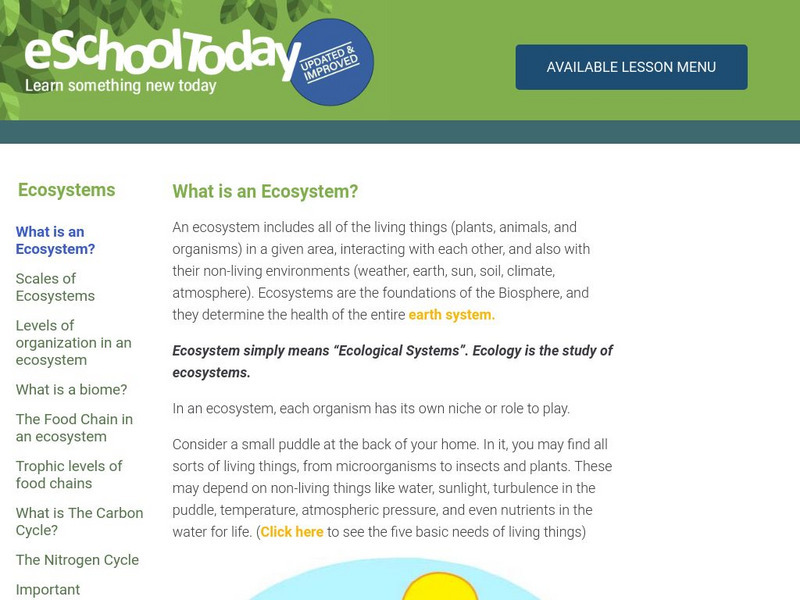
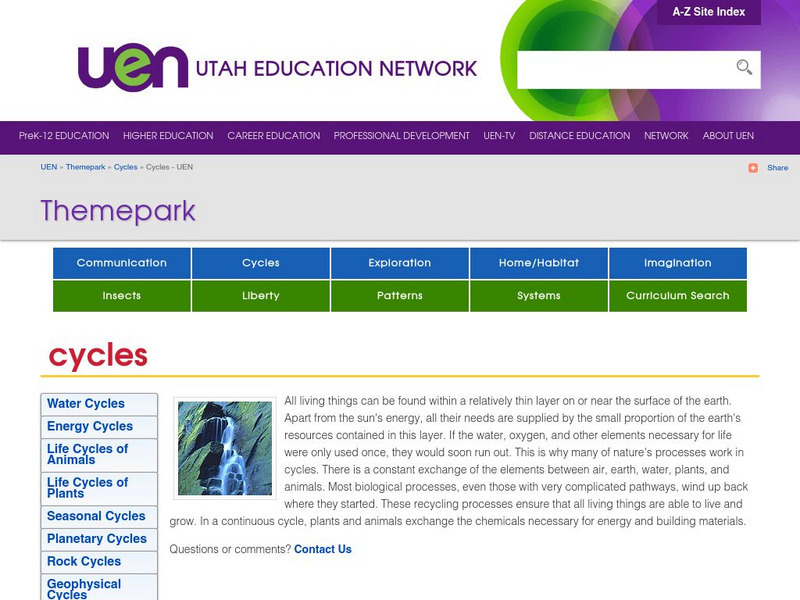

![Kentucky Coal Education: Making Sedimentary Rocks [Pdf] Activity Kentucky Coal Education: Making Sedimentary Rocks [Pdf] Activity](http://lessonplanet.com/content/resources/thumbnails/410005/large/bwluav9tywdpy2symdiwmduymc0xotawmi03cdyzni5qcgc.jpg?1589984663)





